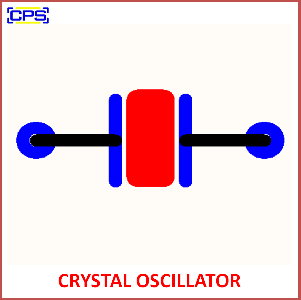A crystal oscillator is an electronic device that uses the mechanical resonance of a piezoelectric crystal (typically quartz) to generate a stable and precise frequency. It is widely used in clocks, communication systems, and electronic devices where accurate timing and frequency stability are essential.

Key Features of a Crystal Oscillator:
- Piezoelectric Crystal:
- The core component, usually quartz, vibrates at a specific frequency when an electric field is applied.
- The frequency depends on the crystal’s size, shape, and cut.
- Stable Frequency:
- Provides a highly consistent and precise output frequency over time and environmental conditions.
- Frequency Range:
- Operates in a wide frequency range, typically from a few kilohertz (kHz) to hundreds of megahertz (MHz).
- Circuit Design:
- Includes an amplifier to sustain oscillations and feedback to maintain stable operation.
Applications:
- Timing Devices: Used in watches, clocks, and microcontrollers for timekeeping.
- Communication Systems: Provides carrier and reference frequencies for radio, TV, and telecommunication devices.
- Computers and Electronics: Ensures precise timing for processors and digital circuits.
- Signal Processing: Used in frequency generation and modulation.
The precision and reliability of crystal oscillators make them indispensable in modern electronic and communication systems.
